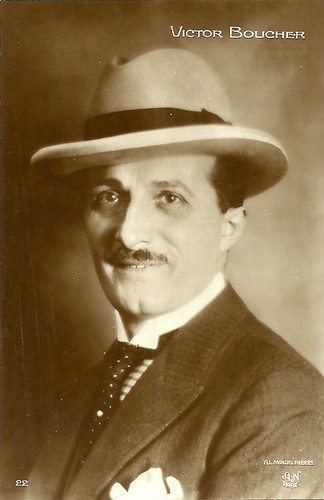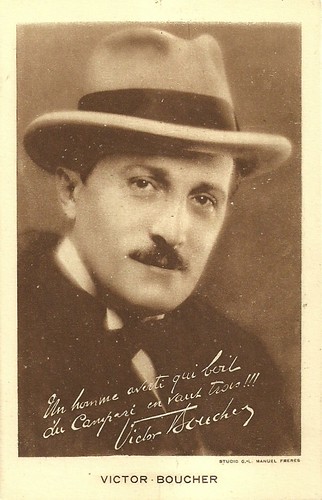Victor Boucher (1877–1942) was a French stage and screen actor, who was popular as a comedian of the early French sound ccinema.
![Victor Boucher]()
French postcard by A.N., Paris, no. 22. Photo: G.L. Manuel Frères.
![Victor Boucher]()
French postcard for Campari. Photo: Studio G.L. Manuel Frères. Caption: "Un homme averti qui boit du Campari en vaut trois!!!" (A man forewarned who drinks Campari equals three).
Talent as a Comedian
Victor Louis Armand Boucher was born 24 August 1877 in Rouen in a house in the Rue Saint-Étienne-des-Tonneliers. His parents ran a café-restaurant at Bihorel. After attending school at Rouen, he debuted on stage at the Cercle de jeunesse. After working as a bookkeeper in Rouen and doing his military service, he moved to Paris. Probably his first part he got was in the play Thermidor at the Comédie Française in 1891. He married Mariotta Claire at Neufchâtel-en-Bray in 1902. In 1905 he was lucky to replace an ill actor at the Théâtre des Mathurins with the play Nono and soon he became known for his talent as a comedian, performing from 1905 till 1907 at the Theatre de Vaudeville, from 1907 till 1908 at the Theatre de la Renaissance and so on.
![Mona Goya]()
Mona Goya. French postcard for Campari. Photo: Studio G.L. Manuel Frères. Caption: "J'ai deux amours Paris et Campari." (I have two loves, Paris and Campari).
Prolific Film Actor
In 1913 Victor Boucher also started to act in film. he appeared first in La Petite Chocolatière (1913) by André Liabel, followed by L'Idée de Françoise by Emile Chautard. However, in the 1920s he was foremost a stage actor, first mostly at the Théâtre du Gymnase, later at the Théâtre de la Michodière. In 1927 Boucher became the manager of Théâtre de la Michodière, which became his fixed theatre between the late 1920s and 1940. Boucher also became chair of the Association des artistes dramatiques. When sound film arrived in France, Boucher became a prolific film actor there as well. Between 1930 and 1941, he mostly played in light comedies that are now all forgotten. They didn't make it into he canon of French film history, such as Robert Siodmak's comedy Le sexe faible (1933). Here Boucher is a stylish butler who is involved in the intrigues of his patrons. He acted oppositie Mona Goya in La Banque Némo (Marguerite Viel, 1934). In the late 1930s Boucher was often paired with Elvire Popesco. Victor Boucher died in 1942 in Ville-d'Avray, France.
![Elvire Popesco]()
Elvire Popesco. French postcard by A.N., Paris, no. 64.
Sources: Wikipedia (French and English), and IMDb.

French postcard by A.N., Paris, no. 22. Photo: G.L. Manuel Frères.

French postcard for Campari. Photo: Studio G.L. Manuel Frères. Caption: "Un homme averti qui boit du Campari en vaut trois!!!" (A man forewarned who drinks Campari equals three).
Talent as a Comedian
Victor Louis Armand Boucher was born 24 August 1877 in Rouen in a house in the Rue Saint-Étienne-des-Tonneliers. His parents ran a café-restaurant at Bihorel. After attending school at Rouen, he debuted on stage at the Cercle de jeunesse. After working as a bookkeeper in Rouen and doing his military service, he moved to Paris. Probably his first part he got was in the play Thermidor at the Comédie Française in 1891. He married Mariotta Claire at Neufchâtel-en-Bray in 1902. In 1905 he was lucky to replace an ill actor at the Théâtre des Mathurins with the play Nono and soon he became known for his talent as a comedian, performing from 1905 till 1907 at the Theatre de Vaudeville, from 1907 till 1908 at the Theatre de la Renaissance and so on.

Mona Goya. French postcard for Campari. Photo: Studio G.L. Manuel Frères. Caption: "J'ai deux amours Paris et Campari." (I have two loves, Paris and Campari).
Prolific Film Actor
In 1913 Victor Boucher also started to act in film. he appeared first in La Petite Chocolatière (1913) by André Liabel, followed by L'Idée de Françoise by Emile Chautard. However, in the 1920s he was foremost a stage actor, first mostly at the Théâtre du Gymnase, later at the Théâtre de la Michodière. In 1927 Boucher became the manager of Théâtre de la Michodière, which became his fixed theatre between the late 1920s and 1940. Boucher also became chair of the Association des artistes dramatiques. When sound film arrived in France, Boucher became a prolific film actor there as well. Between 1930 and 1941, he mostly played in light comedies that are now all forgotten. They didn't make it into he canon of French film history, such as Robert Siodmak's comedy Le sexe faible (1933). Here Boucher is a stylish butler who is involved in the intrigues of his patrons. He acted oppositie Mona Goya in La Banque Némo (Marguerite Viel, 1934). In the late 1930s Boucher was often paired with Elvire Popesco. Victor Boucher died in 1942 in Ville-d'Avray, France.

Elvire Popesco. French postcard by A.N., Paris, no. 64.
Sources: Wikipedia (French and English), and IMDb.